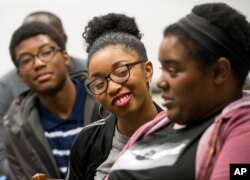White and Asian students in the United States continue to out perform their black and Latino counterparts nationwide, according to the U.S. Department of Education's 2015 Nation’s Report Card that assesses nationwide student achievement.
High school students Robin Choi and Jewell Prim share one key ingredient that makes them academically successful.
“Every since I can remember, college has never been a choice, it is something that is essential," said Prim.
“My parents have always told me since I was a child that education was an investment to my career," said Choi.
Both students attend Harbor Teacher Preparation Academy, a school that gives them as much support as they get at home. But not every school presents this type of experience.
English teacher Natalie Collier says if students do not get basic academic skills by the time they reach high school, many of them become disinterested. And that is just one challenge.
“The lack of motivation also comes from outside the environment. If the critical mass is not focused on education then I believe it kind of trickles down and that becomes the influence," said Collier.
Latino and black students are most effected by socio-economic challenges that keep them from excelling when compared to their white and Asian counterparts, says University of California Los Angeles education professor Marcelo Suarez-Orozco.
”Both Latino children and African American children are once again attending schools that are highly segregated. They are highly segregated by race, by poverty, by language by legal status," said Suarez-Orozco.
All factors that contribute to an achievement gap that continues into college, says Ken O’Donnell, California State University’s Senior Director of Student Engagement.
“If you are the first in your generation to come to college then that is a strike against you. We have to work harder to keep those people in school because the support networks are not in place," said O’Donnell.
O’Donnell says the achievement gap can have lasting repercussions.
“The students who come to us under-prepared are likelier to drop out and likelier to take longer to graduate and, so for their life outcomes after graduation, in terms of lifetime earnings, happiness, health outcomes, all those benefits that come with earning a degree for them are delayed by at least several years and may not happen at all," he said.
At Harbor Teacher Preparation Academy, teachers begin talking about college as soon as the students start high school. They try to empower the students and provide a personalized approach to teaching says Principal Jan Murata.
“Unless you reach that child and show that you care and get the students there and believe in them, then it makes it really difficult," said Murata.
For many of today’s teachers, UCLA’s Suarez-Orozco says reaching students means being sensitive to the cultural, linguistic and economic barriers they face.
“So knowing your students, knowing where they are coming from, knowing their communities," he said.
But influences and responsibilities outside the classroom may continue to cause an achievement gap among black and Hispanic students in many schools.






